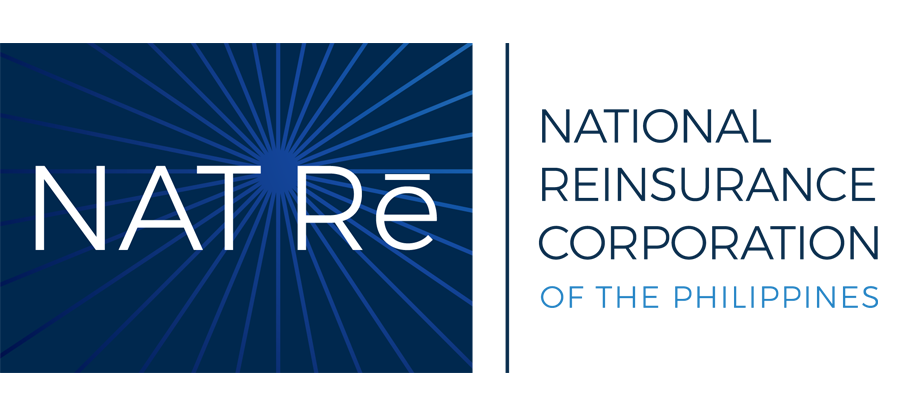POLICY STATEMENT
- National Reinsurance Corporation of the Philippines (the “Company”) believes that maintaining a peaceful and harmonious work environment will contribute to increased work productivity and employee job satisfaction. In order to achieve this, it is necessary to establish standards of conduct among its employees and to promote employee discipline and compliance with Company policies, rules, regulations and procedures.
- In support of the Company’s Code of Ethics which identifies the norms of business conduct and ethics that all Company employees are expected to commit to, the Company maintains a set of rules and regulations which serves as a guide to employee behavior and actions in the workplace.
- Employment in the Company signifies willingness and commitment to perform according to standards set by management and to abide by all the policies and procedures as well as rules and regulations of the Company.
- The right to fire and discipline are purely management prerogatives. Management shall take administrative or disciplinary action for employee violations of Company policies, procedures, rules and regulations, in order to preserve order and discipline within the organization.
- In carrying out its responsibility and prerogative to fire and discipline, management shall at all times uphold the value of fairness and render decisions affecting its employees in a just and impartial manner.
PURPOSE/OBJECTIVE
These Rules of Conduct serve as a guide on how employees of Nat Re are expected to behave. It aims to help employees understand what is important to the Company as well as what is deemed acceptable and unacceptable behavior.
SCOPE
All employees of the Company.
GUIDELINES
- Taking disciplinary action is basically the responsibility of the immediate head of the employee concerned, in the same manner that he / she is responsible for ensuring that his / her staff are performing their work and conducting themselves in accordance with expectations and standards set.
- Employees found to have violated Company rules and regulations and are subject to disciplinary action, such as suspension or dismissal, shall be accorded a fair and impartial investigation. He / she shall be given the opportunity to explain himself / herself before any disciplinary action is decided on and carried out.
- In most cases, disciplinary action is taken as a corrective measure. Depending upon the severity of the case, Management shall adopt a system of progressive discipline, as follows:
3.1 Written Warning. A written warning is given to the employee concerned, a copy of which will be placed in the employee’s 201 file. A series of written warnings may be issued prior to imposing a heavier or more serious disciplinary action. There are cases, however, when the employee may be subject to suspension or dismissal depending on the nature of the offense.
3.2 Suspension without pay and benefits. Generally, this is imposed when, after being given a warning or warnings, the employee does not show any change in behavior. Suspension may range from 3 to 5 days depending on the seriousness of the violation.
In order to protect the interest of the Company and those involved in the case, management may impose preventive suspension at any time.
3.3 Dismissal / Termination of Employment. This disciplinary action is normally taken when all other forms of discipline have been used or when the nature or the severity of the offense justifies such action.
- An employee has the right to appeal any disciplinary action or penalty imposed on him / her.
- Restitution / Forfeiture of Benefits
5.1 Restitution may be imposed independently or along with any other penalties in cases of loss or damage to Company properties, its employees, or clients. The Company may recover the amount involved by salary deduction as a means for offender to pay the amount involved. Restitution, however, shall in no way lessen the penalties attached to the infraction.
5.2 Forfeiture of benefits or privileges may also be effected in cases where violations were incurred in connection with or arising from availment of said benefits.
- Generally, violations of policies, rules and regulations are cumulative within the tenure of the employee. Cases involving attendance and punctuality shall be considered cumulative within a calendar year (except cases of AWOL that may be subject to dismissal on the first offense, depending on the circumstances).
- All offenses not specifically described herein shall be dealt with in a manner deemed appropriate by management, depending upon the circumstances of each case.
- Management reserves the right to impose a lower penalty than what is prescribed in the code of conduct depending on the damage caused by the violation, the circumstances of each case and the aggravating and/or mitigating conditions surrounding the case.
- Taking administrative action is without prejudice to pursuing appropriate criminal and/or civil action by the Company against the offender.
- The Company’s performance management system is likewise a means through which employee discipline is maintained and where employee work performance and behaviors that are not in accordance with Company policies, procedures, rules and regulations, are documented and corrected.
- Rules of Conduct
This set of Rules of Conduct is for the proper guidance and compliance by all employees. It incorporates the core values and norms of behavior that the Company strives to uphold in all aspects of its business.
This must be read in conjunction with the Company’s Code of Ethics.
The table of administrative offenses and sanctions below shall have the following legend:
WW – Written Warning
FWW – Final Written Warning
S (#) – Suspension (number sign after S represents no. of days)
D – Dismissal
11.1 Upholding FAITH, Trust and Confidence
The Company identifies Fairness, Accountability, Integrity, Transparency and Honesty as its core values to be observed by all directors, officers and employees in carrying out their responsibilities, protecting the interests of the Company, as well as in following the Company’s policies, procedures, rules and regulations.
The offer of employment by the Company and the acceptance of the offer by the employee imply a commitment to one another to deal with each other in a fair, honest and just manner.
These values are particularly important in the Company because the business of insurance and reinsurance are based on the principle of utmost fidelity and good faith. The insurer or reinsurer relies on the honesty and integrity of client information obtained as a prerequisite to risk acceptance. In the same manner, the insuring and reinsuring public relies on the ability of the Company to make good its “promise” or commitment to indemnify our clients. All Company employees must therefore have unquestionable integrity.
From the point of view of management, executives, managers and supervisors are entrusted with a great deal of trust and confidence by the Company. They are entrusted with responsibility for managing people in order to help the Company establish and achieve its goals and objectives. Carrying out their supervisory and managerial responsibilities comes with specific authorities, which they are expected to use prudently.
The Company likewise expects all employees to maintain the confidentiality and security of information, funds and business records entrusted to them in the course of doing their work.
It is every employee’s responsibility to handle funds for its intended purpose and in accordance with Company rules and regulations.
It is also the primary responsibility of employees to not reveal or divulge at any time during employment or after employment, any information acquired during employment with the Company concerning any of the activities, transactions or affairs of the Company and its clients, where such disclosure could be useful to the Company’s competitors or could otherwise harm the interests of the Company and its clients, business sources and affiliates.
Officers and employees who have knowledge of and access to material information not yet disclosed to the public are prohibited to use these information in trading Company securities / shares. Material information includes but is not limited to financial results, projections of future earnings or losses, news of pending merger or acquisition, changes in the corporate structure and key management positions, etc.

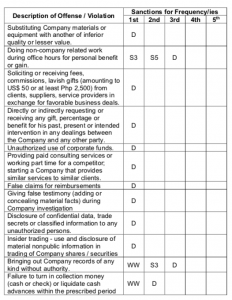
The primary responsibility of an employee is to perform well the job that is assigned to him/her by his/her immediate superior. In fact, this is the primary reason why the employee was hired. He/she is expected therefore to carry out his/her responsibilities dutifully and in accordance with the standards set by management.
11.2 Job Performance

11.3 Health, Safety, Security and Proper Use of Company Assets
The Company is committed to providing and maintaining a safe, secure and healthy work environment. In turn, the employee has the responsibility to work safely, to keep work areas and common areas in the Company neat and clean, not just to reduce the chances of injury but also to make the office a more attractive and pleasant place to work in.
Employees are urged to report to their immediate superior or to the Human Resources and Office Services (HROS) Department accidents or any condition or practice that is deemed unsafe, whether or not these result in personal injury, or no matter how minor they might seem to be.
Employees are also responsible for the proper use of all Company property such as, but not limited to, facilities, equipment, software, vehicles and supplies.
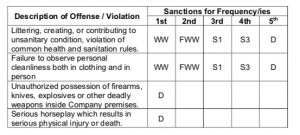
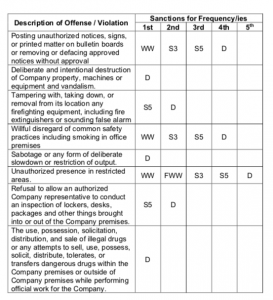
11.4 General Conduct & Behavior
All employees are expected to conduct themselves in a disciplined manner, consistent with right conduct and proper office decorum.
As individuals, employees and clients must be accorded with respect, treated politely and courteously.
Should problems arise, each employee is expected to deal with the situation in a mature manner, taking on an earnestly thoughtful character or sober disposition. They should be careful so as to not to cause any harm on others.
Employees must always keep an open mind in dealing with problem situations. They must be open to discussing concerns and must strive to arrive at a resolution that is acceptable to all parties involved.
Employees must also take responsibility for their work, their actions and behaviors. As adults, they are expected to be aware of the effect of their actions, attitudes and behavior on others. In line with this stand, the Company aims to promote an office atmosphere where people have high respect for one another and to maintain a work environment that is free from all forms of sexual harassment or intimidation. It supports RA 7877, the Anti-Sexual Harassment Act of 1995, an act declaring sexual harassment unlawful in the employment, education and training environment, and for other purposes. (See policy on Sexual Harassment)
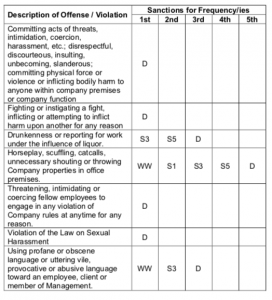

11.5 Attendance and Punctuality
Employees are expected to perform their work according to management expectations and following Company office hours. They are expected to report for work regularly and to be punctual in coming to the office.
Being a service-oriented Company, the capability of providing excellent customer service is largely dependent on the availability and capability of Company employees to attend to client requirements as needed.
Employees are also expected to report for work regularly so as not to create problems in scheduling tasks and in order not to disrupt the flow of work in his/her unit.


11.6 Time Keeping
All employees are expected to use the Company biometrics system each time they enter and leave Company premises.
Non-Exempt Employees, in particular, must time in when they report for work and time out when they leave the office. This system will assist the HROS in validating overtime hours worked.

11.7. Implementation and Monitoring of the Rules of Conduct
11.7.1 If there is any indication or evidence showing that a violation has been committed by an employee, the immediate head shall inform and coordinate closely with the HROS Head or HR Business Partner, initiate the preparation of an administrative action memorandum to inform the employee of the observed violation and to ask him/her to explain in writing within twenty four (24) hours (or forty eight (48) hours depending on the complexity of the case) why no disciplinary action, as specified in the table of administrative offenses and sanctions, should be taken against him / her.
11.7.2 The HROS Head or HR Business Partner shall review the circumstances of the case and the administrative action memorandum / letter before its release to the employee concerned. If the nature of the wrongdoing or the result of the preliminary investigation of the case warrants the preventive suspension of the employee, the head shall immediately implement the preventive suspension upon seeking clearance from the senior leader or the President & CEO and the HROS Head.
The head, senior leaders concerned and HROS may likewise seek the assistance of Internal Audit depending on the nature of the case and the kind of assistance required.
11.7.3 The head shall determine the facts of the case, evaluate all the reports and findings together with the written explanation of the employee, and, as soon as possible, together with the HROS Head or HR Business Partner decide and enforce the appropriate action using the table of administrative offenses and sanctions as reference.
11.7.4 The HROS Head shall review all decisions for suspension and dismissal or termination of employment prior to implementation and other cases referred to it. He/she determine whether or not the legal requirements of just cause and due process have been complied with.
11.7.5 If the HROS Head agrees with the dismissal / termination of the employee under investigation, the immediate head through his/her senior leader, shall secure the confirmation of the President & CEO.
12. Grievance Procedure and Disclosure Process
a) The Company holds all its employees in esteem and believes in protecting their rights and dealing with employee concerns and problems promptly and effectively.
b) It is the policy of the Company to provide prompt, effective and acceptable means for employees to bring problems and complaints concerning their work and their well being at work to the attention of management.
c) A grievance is any condition of employment that the employee feels is unjust or unfair or thinks should be brought to the attention of Company management. To ensure prompt attention, grievances should be submitted within five (5) working days of the event prompting the grievance.
d) To the extent possible, grievances shall be brought and resolved in accordance with the following guidelines:
i. Any grievance must first be given orally or in writing to the employee’s immediate supervisor/manager. The employee should submit the grievance personally but may ask a fellow employee to appear with him/her.
ii. If the grievance was not written out by the employee, it should be written by the supervisor/manager for record purposes. Grievances must be signed by the supervisor/manager and the employee.
iii. The employee’s supervisor/manager shall attempt to resolve the question and must respond within three (3) working days in writing, describing the steps taken to correct the problem. If the employee’s supervisor/manager cannot correct the problem, the supervisor will submit a written response to the HROS Head for review. The HROS Head will follow the grievance through to final solution, taking it to the President of the Company for final arbitration if necessary.
iv. If the employee is not comfortable submitting the grievance to his/her immediate superior, the employee may submit the grievance to the next higher manager in his department or directly to the HROS Head after receiving the manager’s permission. The HROS Head will then write out the grievance and discuss it with the employee’s supervisor before taking it to final solution.
e) The Company does not condone any dishonest, unethical or unprofessional behavior and actions displayed by an employee, regardless of his/her level of authority. It is the responsibility of each employee to report legitimate concerns so that issues can be properly investigated or resolved and corrective measures can be instituted. These concerns may involve commission of fraud, theft or corruption, unauthorized use of Company funds and properties, breach of a legal obligation, internal or external regulation or any procedure regarding accounting, auditing matters, as well as alleged irregularities of a general, operational and financial nature in the company.
f) Legitimate concerns or disclosure of alleged wrongdoing shall be brought and resolved in accordance with the following guidelines:
i. An employee raising a concern or reporting a wrongdoing must ensure the accuracy of his/her information. He/she should give this careful consideration and take advice prior to making a complaint. If it is proven that the complaint is done with malicious intent or for personal gain, disciplinary action may be taken against the reporting employee.
ii. Concerns may be raised verbally or in writing to the HROS Head (Regina Lourdes D. Papa, office number: 8988-7493; HR mobile number 0917- 5698328). Concerns involving the HROS Head should be raised to the President and CEO (Allan R. Santos, office number: 8988-7446; office mobile number: 0917-1800133, while complaints concerning the CEO should be raised to the Chairman of the Nomination and Compensation Committee of the Company’s Board of Directors, Reginaldo Anthony B. Cariaso (direct line/office number:_________). When raising a concern or complaint, the employee should give the background, the nature of the alleged wrongdoing or a description of the event, relevant dates, reasons for the concern, witnesses and the names of the individuals involved.
iii. If the concern is raised verbally, then the person receiving the information should prepare an outline of the matters raised.
iv. Management shall maintain the confidentiality of all the concerns or complaints raised and the anonymity of the person making the complaint to the fullest extent reasonably practicable within the legitimate needs of law.
v. The HROS Head/monitoring officer shall be responsible for deciding whether there are grounds for proceeding further with the case. Potential action may include a clarification of facts, a more formal investigation conducted by the Senior Leadership Team or Internal Audit Department, or referral to external auditors or legal consultants. Concerns that fall within the scope of specific procedures shall be referred for consideration under those procedures.
vi. The monitoring officer (or the HROS Head/CEO/Chairman of NCC as the case may be) shall inform the reporting employee in writing within 7 working days of the following:
a. What has been done or how monitoring officer plans to deal with the matter;
b. an estimate of how long it might take to give a final response;
c. if an initial inquiry has been made;
d. if further investigation will take place;
e. any further information that may be sought from the employee.
vii. The monitoring officer, subject to legal constraints, will provide the employee with information on the outcome of any investigation.
ADMINISTRATION
- The heads, Senior Leaders and HROS shall be jointly responsible for the administration of this policy.
- The HROS Department shall assist management in ensuring that Company policies, rules and regulations are uniformly implemented. It shall likewise endeavor to regularly review such policies and regulations and recommend revision to management.
- Management reserves the right to alter, amend or revise these rules when the circumstances warrant such revision subject, however, to appropriate publication.
Address
business hours
8:00 am – 5:00 pm (GMT+8)
Closed on Saturdays, Sundays, and public holidays
contact us
Email
info@nat-re.com
(for investor relations, potential partners, and general inquiries)
hr@nat-re.com
(for job applications)
Trunk Line
+63 (2) 8988 7400
Fax
+63 (2) 8988 7497
Connect with Us
